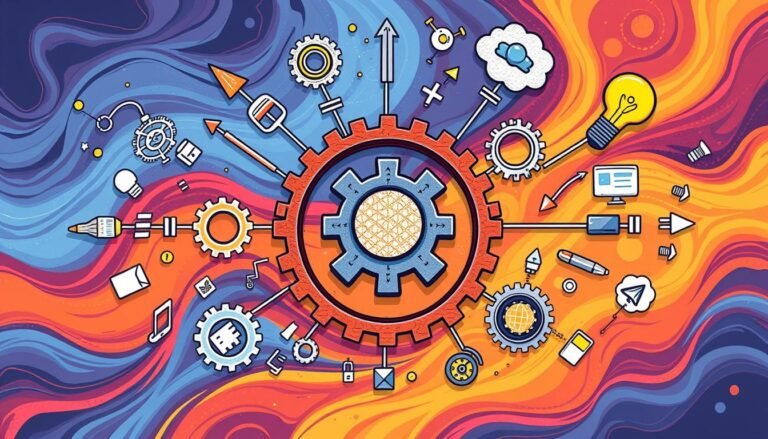Psychological Flexibility at Work
In today’s fast-paced work environment, psychological flexibility is key to success. It lets employees adapt to changes while keeping up their performance. By focusing on tasks, setting clear goals, and boosting intrinsic motivation, people can improve their mental agility and work performance.
Studies show that psychological flexibility helps people stay focused for longer. It also boosts motivation by linking tasks to personal goals and values. This adaptability helps individuals know when to keep going or when to change direction, avoiding unproductive patterns.
To develop psychological flexibility, training in present moment awareness, thought defusion, and values-based action is needed. By reducing experiential avoidance, which is linked to lower well-being and performance, employees can enhance their quality of life and professional success.
Key Takeaways
- Psychological flexibility enhances task focus and mindfulness
- It increases motivation by linking tasks to personal goals and values
- Adaptability helps in recognizing when to persist or change behavior
- Minimizing experiential avoidance improves well-being and performance
- Training in awareness, defusion, and values-based action develops flexibility
- Psychological flexibility leads to higher motivation and task-focus
Understanding the Core Principles of Workplace Psychology
Workplace psychology studies how people act at work. It aims to make employees happier and work better together. It now focuses more on being mentally agile and adaptable.
The Evolution of Mental Agility in Professional Settings
Mental agility is key in today’s fast work world. It means being aware of oneself, mindful, and guided by values. Companies see how important it is for happy employees and success.
Key Components of Psychological Adaptability
Psychological adaptability includes several important skills:
- Present moment awareness
- Cognitive defusion
- Values clarification
- Committed action
- Acceptance
These skills help people be their best at work. They avoid acting on impulse and make smart choices.
The Science Behind Mental Flexibility
Studies show mental flexibility boosts focus, motivation, and understanding of behavior. Industrial and Organizational psychologists use science to solve work problems and improve performance.
| Psychological Flexibility Benefits | Impact on Workplace |
|---|---|
| Improved employee health | Higher job satisfaction |
| Enhanced problem-solving | Better team collaboration |
| Increased resilience | Reduced job stress |
By using strategies for mental flexibility, companies can make a better work place.
Psychological Flexibility at Work: A Comprehensive Overview
Psychological flexibility is key in today’s fast-changing work world. It helps people adjust to new situations while keeping a good Work-Life Balance. This skill makes employees do well in changing work environments, boosting their mental health.
At its heart, psychological flexibility is about being aware, open, and acting on values. These parts work together to help solve work problems. People with this skill solve problems better, communicate well, and feel less stressed.
Research shows how important psychological flexibility is at work:
- Mayo Clinic says reducing stress through flexibility can help with health issues like headaches and high blood pressure.
- Studies find that improving psychological flexibility can lead to fewer absences at work.
- Training in Acceptance and Commitment Therapy (ACT) has been shown to lower stress and burnout at work.
Building psychological flexibility takes time and effort. Organizations can help by supporting mental agility and resilience in their teams.
“Psychological flexibility is not just about adapting to change, but thriving in it. It’s the cornerstone of a healthy, productive work life.”
By promoting psychological flexibility, companies can have a more resilient and happy team. This benefits both the employees and the company, leading to better job satisfaction and business results.
Essential Skills for Developing Mental Resilience
Building mental resilience is key in today’s fast world. With 65% of US employees seeing their jobs as a major stress, it’s vital to learn coping skills. Let’s look at three important techniques to boost your mental resilience and flexibility at work.
Present Moment Awareness in Professional Settings
Mindfulness is crucial for staying in the present. It helps reduce stress and boosts productivity. Try deep breathing or short meditation breaks to stay focused and alert.
Cognitive Defusion Techniques
Cognitive defusion helps you not get caught up in negative thoughts. When stress hits, label your thoughts without judgment. This keeps you from getting stuck in bad thinking patterns, making you more mentally flexible.
Values-Based Decision Making
Aligning your actions with your values makes work more fulfilling. Identify your core values and use them to guide your decisions. This approach gives you purpose and helps build long-term mental resilience.
By learning these skills, you can handle work challenges better. Remember, resilience grows over time. Using these techniques can make your job more satisfying, help manage stress, and improve your overall well-being.
The Impact of Psychological Flexibility on Work Performance
Psychological flexibility is key in the workplace. It helps employees deal with challenges, solve problems better, and work well together. Let’s see how this mental flexibility helps at work.
Enhanced Problem-Solving Capabilities
Workers with high psychological flexibility tackle problems with a fresh perspective. They stay focused longer and adjust their plans when needed. This flexibility helps them know when to keep going and when to change direction, leading to better problem-solving.
Improved Team Collaboration
Psychological flexibility makes teams work better together. Employees who are mentally agile communicate well with their team. They’re open to different ideas and adjust their approach based on the team’s needs. This adaptability makes the work environment positive and boosts team performance.
Stress Management Benefits
Psychological flexibility is also great for managing stress. Employees who use this skill feel less stressed and are happier at work. They handle work pressures better and stay productive even when things get tough.
| Aspect | Impact of Psychological Flexibility |
|---|---|
| Work Engagement | Higher levels associated with increased engagement |
| Job Satisfaction | Increased satisfaction reported among flexible employees |
| Burnout Rates | Lower burnout rates observed in psychologically flexible staff |
Studies show that promoting psychological flexibility at work improves health and productivity. Companies that focus on this skill see happier and more productive employees. By embracing psychological flexibility, businesses can build a strong and adaptable team ready for today’s fast-paced work world.
Building Psychological Flexibility Through Mindfulness
Mindfulness is key to being flexible at work. It helps employees stay present and adapt to new situations better. This boosts their emotional smarts.
Studies back up the benefits of mindfulness. Activities like meditation and yoga make us mentally flexible. They help us handle work challenges while staying true to our values.
Work stress affects many, with 28% of workers feeling it. Mindfulness can reduce stress and improve well-being. It makes us more resilient and productive at work.
“The ideal ratio for psychological health is at least 3 positive experiences to each negative one, highlighting the importance of cultivating positive emotions through mindfulness practices.”
Adding mindfulness to our daily lives can:
- Improve emotional control
- Boost problem-solving skills
- Make us more adaptable
- Encourage growth
Mindfulness-based therapies, like Acceptance and Commitment Therapy (ACT), help with work stress. They open us up to new experiences and views. This leads to more flexibility in our jobs.
Implementing Acceptance and Commitment Strategies
Acceptance and Commitment Therapy (ACT) is great for improving work life and performance. Let’s see how to use these strategies.
Workplace Acceptance Practices
It’s important to face work challenges without judgment. This reduces stress and builds resilience. A study with 98 healthcare staff showed 48% felt better after ACT training.
Commitment to Professional Growth
ACT promotes continuous learning. It’s about setting goals and working towards them with purpose. This dedication can spark innovation and boost job performance.
Value-Aligned Action Steps
It’s vital to act in line with your values. This creates a sense of purpose and authenticity at work. Here are some important stats:
| Metric | Percentage |
|---|---|
| UK healthcare professionals reporting work-related stress | 37% |
| UK healthcare staff experiencing psychological distress | 25% |
| Improvement in psychological distress after ACT intervention | 48% |
By using these strategies, companies can build a stronger and more productive team. ACT has helped many sectors, like media, government, and education. It’s a strong way to improve employee well-being and support Professional Growth through Value-Aligned Actions.
Overcoming Workplace Challenges with Mental Agility
Mental agility is key to beating workplace challenges. Today’s work world needs workers who are resilient and can adapt. With 65% of workers seeing their job as stressful, being mentally flexible is essential.
Workplace issues can hurt productivity. The CDC says mental health problems can cut cognitive performance by 35%. This shows why resilience and mental agility are important at work. Workers who can recover from setbacks and adjust to changes do better under stress.
Mental agility helps workers deal with surprises and find new ways to solve problems. It’s not just about getting through tough times. It’s about thriving in them. Employees who stay calm and focused during hard times keep making important contributions.
“Mental agility is the key to unlocking potential in the face of adversity.”
Companies are starting to see the value of mental health support. A survey shows 81% of employees look at mental health initiatives when choosing a job. This shows how important being mentally flexible is at work. By improving mental agility, companies can build a stronger and more productive team.
- Embrace change as an opportunity for growth
- Practice mindfulness to stay present and focused
- Develop problem-solving skills to tackle challenges head-on
- Build a support network to share experiences and strategies
By working on these skills, professionals can boost their mental agility. This lets them face workplace challenges with confidence. Remember, being resilient is not about avoiding stress. It’s about coming back stronger.
The Role of Emotional Intelligence in Psychological Flexibility
Emotional intelligence (EI) is crucial for being flexible at work. It helps us understand and manage our emotions. This is key for adapting to changes and challenges.
Self-Awareness Development
Self-awareness is at the heart of emotional intelligence. It means knowing your thoughts, feelings, and actions. People with high self-awareness can spot their emotional reactions at work.
This skill lets them adjust their responses to different situations. It boosts their ability to be flexible.
Emotional Regulation Skills
Emotional regulation is another important part of EI. It’s about managing your emotions in a healthy way. Workers with good emotional regulation stay calm under pressure.
They also bounce back from setbacks quickly. Studies show that reacting strongly to both good and bad events can lead to higher well-being. This means healthy emotional responses help us handle work stress better.
Social Awareness in the Workplace
Social awareness is the third part of EI. It’s about understanding others’ emotions and needs. This skill helps build stronger work relationships and better teamwork.
Employees with high social awareness can read the room and adjust their communication style. This flexibility leads to smoother collaboration and a more positive work environment.
Source Links
- The Role of Psychological Flexibility in Building Performance and Wellbeing
- The Power of Psychological Flexibility at Work
- Psychological Flexibility – WorkLifePsych
- How principles of psychology drives workplace settings.
- Psychological Flexibility in the Workplace: A Value-Driven Journey
- Psychological Flexibility and Its Relationship to Distress and Work Engagement Among Intensive Care Medical Staff
- Workplace Mental Health – Resilience: A Strong Workforce Needs It
- Resilience and Adaptability: How You Lead Matters
- Frontiers | Psychological Flexibility and Mindfulness as Predictors of Individual Outcomes in Hospital Health Workers
- Psychological Flexibility: What It Means and Why It’s Important
- Psychological Flexibility as a Fundamental Aspect of Health
- A workplace Acceptance and Commitment Therapy (ACT) intervention for improving healthcare staff psychological distress: A randomised controlled trial
- Working with ACT
- Mental Health At Work: Best Practices For Well-Being
- Towards a more resilient world: Overcoming the challenges of mental health at work – Addezia
- Strategies to Manage Mental Illness at Work
- Developing Emotional Intelligence Part 13 | LearningCog
- A Psychological Flexibility Perspective on Well-Being: Emotional Reactivity, Adaptive Choices, and Daily Experiences
- Frontiers | Psychological Flexibility and Its Relationship to Distress and Work Engagement Among Intensive Care Medical Staff








